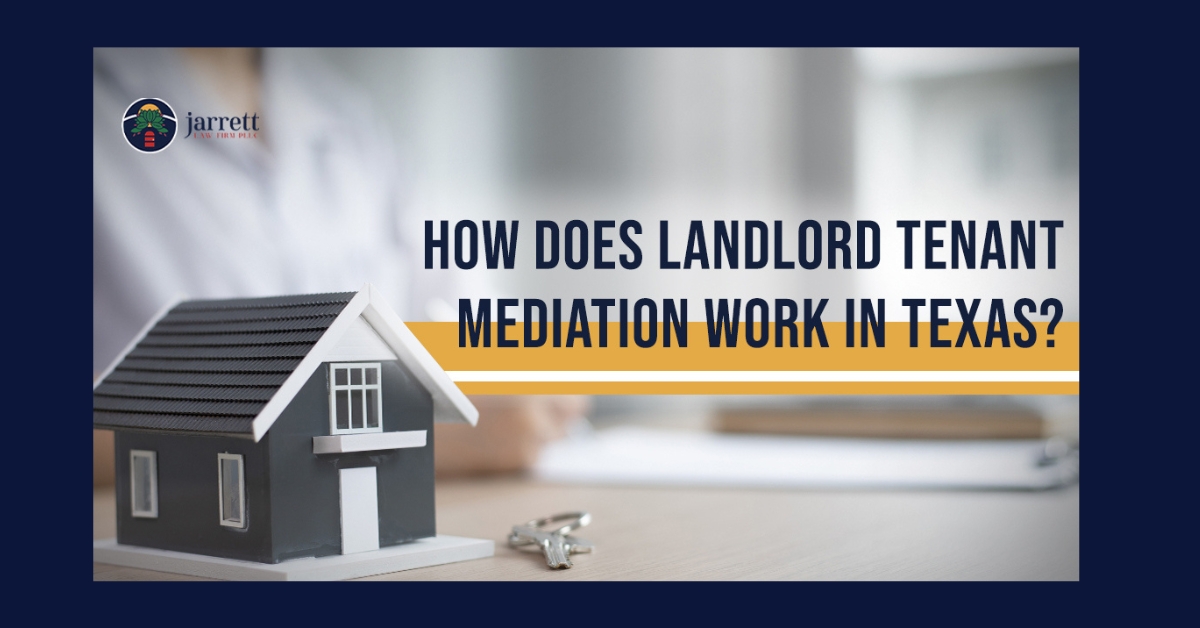As a dynamic and populous state with a diverse housing landscape, Texas has established specific protocols to address conflicts between landlords and tenants. If you are embroiled in a rental or eviction battle, landlord-tenant mediation can give you a legal framework for a cost-effective solution. Find out how landlord-tenant mediation works in Texas to foster harmonious rental relationships.
What are Mediation Services?
As an alternative dispute resolution method, mediation services provide a structured and collaborative approach to resolving disputes outside the courtroom. Mediation is an alternative to traditional litigation. It offers landlords and tenants the opportunity to engage in open dialogue with the assistance of a neutral third party.
Mediators are trained professionals facilitating communication and negotiation between conflicting parties. Mediators guide others toward a mutually acceptable resolution.
Mediation operates on the principles of voluntariness and cooperation. This allows both landlords and tenants to retain a degree of control over the outcome. It also helps them work toward a compromise.
The mediator does not make decisions for the parties involved. Instead, they help facilitate communication, identify common interests, and explore potential solutions.
This approach often leads to quicker and more cost-effective resolutions. Compared to court proceedings, mediation helps preserve the ongoing relationship between landlord and tenant. Maintaining ties is crucial when two parties will continue to interact because of the rent or lease agreement.
In the state of Texas, mediation services are widely available and encouraged as a means to alleviate the burden on the court system. Mediation also expedites conflict resolution and promotes a sense of fairness and equity for all parties involved.
Disputes may revolve around rental payments, maintenance issues, lease violations, eviction, or other matters. However, mediation offers a constructive platform for reaching a middle ground that benefits both sides.
How Does the Mediation Process Work in Landlord-Tenant Disputes?
The mediation process for resolving landlord-tenant disputes in Texas follows a structured series of steps. These steps facilitate communication, identify common ground, and ultimately reach agreement. While the specific details may vary based on the mediator and the nature of the dispute, the general framework remains consistent:
Initiating the Process:
The mediation process is typically initiated by either the landlord or the tenant. They express their interest in resolving the dispute through mediation. Mediation can be requested, court-ordered, or initiated voluntarily by both parties.
Selection of Mediator:
Once both parties agree to mediate, they select a qualified mediator. The mediator is impartial, neutral, and experienced in facilitating communication and negotiation. Parties can choose a mediator together or use a mediator recommended by a mediation organization.
Scheduling and Preparation:
A mediation session is scheduled at a mutually convenient time, date, and location. Before the session, the landlord and tenant gather relevant documents and information to present their perspectives effectively.
Mediation Session:
During the mediation session, all parties involved gather together. The mediator explains the ground rules, the purpose of mediation, and the confidentiality of the process. Each party is given an opportunity to present their side of the dispute. They highlight their concerns, needs, and proposed solutions.
Open Dialogue:
The mediator facilitates an open and structured dialogue between the parties. This may involve joint discussions or separate private meetings, known as caucuses. These meetings help parties understand the underlying issues and explore potential solutions.
Negotiation and Agreement:
With the mediator’s guidance, the two parties can engage in negotiation, focusing on areas of potential agreement. The mediator helps identify common interests and encourages creative solutions that meet both parties’ needs.
Drafting the Agreement:
If the parties find a resolution, the mediator documents the terms of the agreement in writing. Both parties sign this agreement. Their signatures indicate their commitment to negotiate and abide by the terms outlined.
Enforcement of the Agreement:
The signed agreement is legally binding and confidential. Both parties are expected to adhere to its terms. Failure to comply with the agreement may lead to further legal action.
It’s important to note that mediation is a flexible process, and the mediator adapts their approach to suit the dynamics of each case. Moreover, if the mediation process fails to result in an agreement, the parties still have the option to pursue other legal avenues. Potentially they can choose a further mediation date or take the dispute to court.
In landlord-tenant relationships, the mediation process not only offers a chance to find common ground but also empowers both parties to actively participate in crafting a solution that best suits their needs and interests.
Why Is a Real Estate Attorney a Good Choice as Mediator in Landlord-Tenant Disputes?
In the realm of landlord-tenant mediation, the choice of mediator plays a pivotal role in the effectiveness and fairness of the process. Opting for a qualified mediator with a background in real estate law, such as a real estate attorney, can offer distinct advantages due to their specialized knowledge and experience in the field. Here are several compelling reasons why a real estate attorney makes for a strong mediator choice in resolving landlord-tenant disputes:
Legal Expertise:
Real estate attorneys possess in-depth knowledge of landlord-tenant laws, lease agreements, and property regulations. This expertise allows them to accurately interpret legal documents, navigate complex legal issues, and ensure that any proposed resolutions align with the existing legal framework.
Understanding of Rights and Obligations:
A real estate lawyer or attorney-mediator comprehends landlords’ and tenants’ rights and obligations under Texas law. This understanding helps ensure that any proposed solutions respect the legal rights of both parties, fostering a more equitable outcome.
Effective Communication:
Mediators with legal backgrounds are skilled communicators who can articulate legal concepts in clear and understandable terms for both parties. This facilitates a more productive dialogue and empowers both landlords and tenants to make informed decisions.
Balanced Perspective:
Real estate attorneys are trained to assess cases from a neutral and balanced perspective. Their legal background enables them to identify underlying legal issues, potential risks, and opportunities for resolution that parties without legal knowledge might overlook.
Drafting Precise Agreements:
Crafting a mediation agreement that is clear, comprehensive, and legally sound is crucial. Real estate attorney-mediators excel at drafting agreements that accurately capture the terms of the resolution while minimizing ambiguities that could lead to future disputes.
Knowledge of Precedents:
Real estate attorneys know precedents set by previous court decisions and legal cases. This knowledge allows them to provide informed guidance on how similar disputes have been resolved in the past, which can influence the mediation process positively.
Customized Solutions:
With their legal acumen, real estate attorney-mediators can offer tailored solutions that are practical and legally viable. This ensures that the agreements reached are both realistic and enforceable.
Respect for Confidentiality:
Real estate attorneys are accustomed to upholding confidentiality in legal matters. This trait is essential in mediation, where open discussions and the voluntary exchange of sensitive information are crucial.
When choosing a mediator for a landlord-tenant dispute in Texas, the selection of a real estate attorney can be a strategic decision. Their blend of legal knowledge, communication skills, and understanding of property-related matters can significantly contribute to a smoother and more effective mediation process, ultimately leading to resolutions that are both fair and legally robust.
What is Jury Demand Mediation?
Amid the array of dispute resolution methods available, Texas introduces the concept of “Jury Demand Mediation” as a distinctive approach to resolving legal conflicts.
While more commonly known methods like mediation and arbitration have gained recognition, the evolving landscape of alternative dispute resolution has given rise to innovative techniques such as the “summary jury trial.”
This approach has found its place in the Texan legal system as an effort to streamline case management, reduce backlog, and offer parties an early glimpse into potential trial outcomes.
Summary Jury Trial as a Form of Jury Demand Mediation:
Jury Demand Mediation, specifically embodied in the summary jury trial, signifies a pragmatic shift toward case evaluation and fostering settlement discussions from a perspective that mimics a real jury trial.
Envisioned under Section 154.026 of the Texas Civil Practice and Remedies Code, the summary jury trial serves as a pivotal platform for assessing cases and encouraging parties to engage in meaningful settlement negotiations.
Essence of the Summary Jury Trial:
The essence of the summary jury trial lies in its streamlined nature, encapsulating the essence of a full-fledged jury trial within a concise timeframe. In this process, each disputing party, alongside their legal counsel, presents their respective positions before a panel of six jurors.
These jurors are drawn from the same pool that would have been used for a traditional jury trial, lending authenticity to the process.
Deliberation and Verdict:
Once they’ve presented all evidence, the jurors deliberate to render a just judgment or “verdict” on liability and damages. Unlike a conventional jury trial, jurors are kept unaware if their decision is binding on the parties.
This precaution guards against manipulated deliberations and improbable verdicts, ensuring an unbiased outcome.
Insightful Starting Point for Resolution:
The summary jury trial’s unique attribute lies in providing participants with a sneak peek into how a genuine jury might rule in a trial scenario. With the trial often concluding within a single day, this insight serves as a strategic departure point for further negotiations.
Armed with the preview of potential trial outcomes, parties can make informed decisions on whether to settle or proceed to more extensive legal proceedings. Jury Demand Mediation, as manifested in the summary jury trial approach, symbolizes Texas’ commitment to innovation within the realm of dispute resolution.
By combining the elements of a trial experience with the objectives of mediation, this method offers litigants a potent tool for:
- Expediting case resolution
- Reducing court congestion
- Guiding parties toward mutually agreeable settlements
An Experienced Real Estate Mediation Attorney Can Help
Navigating the intricacies of real estate disputes demands both legal acumen and mediation expertise. At Jarrett Law Firm, an experienced real estate mediation attorney guides you toward a solution with a wealth of specialized knowledge in property law and dispute resolution techniques.
With a deep understanding of the legal framework governing landlord-tenant relationships, property transactions, and real estate regulations, Jarrett Law offers the skillset to facilitate constructive dialogue for landlords in conflict with tenants.
Our ability to interpret complex legal documents, foster effective communication, and navigate the nuances of real estate disputes ensures that the mediation process remains efficient, informed, and equitable.
By leveraging our expertise, we can help both landlords and tenants chart a course toward amicable resolutions that align with legal requirements and promote lasting harmony.

